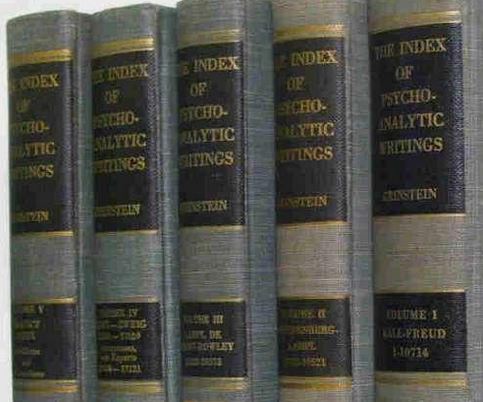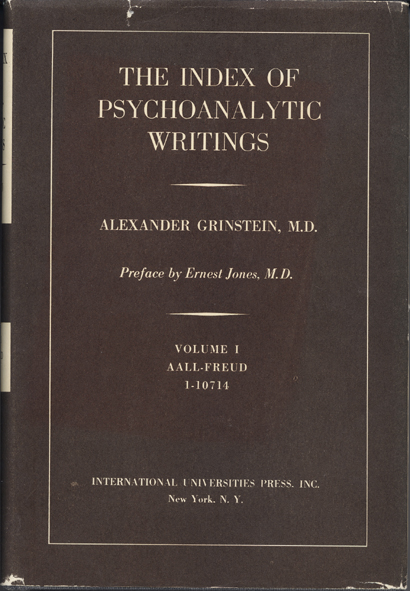Details
| Autor | Grinstein, Alexander |
|---|---|
| Verlag | New York, International Universities Press |
| Auflage/ Erscheinungsjahr | 1956-1975 |
| Format | 23.5 × 16 cm |
| Einbandart/ Medium/ Ausstattung | OLn. mit SU |
| Seiten/ Spieldauer | zusammen 7.400 Seiten |
| SFB Artikelnummer (SFB_ID) | SFB-004474 |
Zu dieser Ausgabe
Ein Fleißwerk der besonderen Art zur psychoanalytischen Publizistik. Auch im Digital- und Computerzeitalter überaus hilfreich und für Bibliotheken und wissenschaftlich mit der Psychoanalyse Befaßte kaum entbehrlich.
Bei der SFB die amerikanische Originaledition des Standardwerkes in der vollständigen Variante in 14 Bänden.
Verzeichnet sind 96.000 Notate, die durch ein umfangreiches Schlagwortregister erschlossen werden. - Die weltweit umfangreichste Bibliographie zur psychoanalytischen Literatur berücksichtigt in einem eigenen Teil die Schriften von Freud, Abraham und Ferenczi in chronologischer Folge. Ferner werden Übersetzungen in zahlreiche Sprachen miteinbezogen.
Das Manual besteht aus insgesamt drei in sich abgeschlossenen Teilen:
- Im ersten Teil wird die gesamte psychoanalytische Literatur bis 1952 aufgeführt;
- im zweiten Teil folgen die Titelnachweise bis zum Jahr 1960 und
- abschließend bietet der dritte Teil die bis 1969 erschienen psychoanalytischen Titel.
Jeder der drei Teile ist durch ein Register erschlossen. Anonyma und Addenda sowie Corregata werden jeweils gesondert aufgeführt. - Bedingt durch den langen Erscheinungszeitraum weisen die Bände leicht unterschiedliche Färbung der Einzlbände auf; zudem wurden verlagsseitig nicht alle Bände mit Schutzumschlägen ausgeliefert.
Über den Herausgeber
"Few analysts have been as active as long or contributed as much to psychoanalysis in Michigan as Dr. Alexander Grinstein. He has touched the lives of almost every practicing analyst in the MPI-MPS as teacher, supervisor, analyst, mentor or friend. Although today the interested student of psychoanalysis and psychoanalytic history is more likely to find him between appointments in his book-lined office than chairing a committee meeting, he is still a vital presence in the community after more than 60 years of service.
Born in Russia, Dr. Grinstein arrived in the U.S. at the age of 5. He earned his undergraduate degree at the University of Buffalo, where he majored in psychology. There he first encountered the works of Freud. He was fascinated, he said, by the idea of the unconscious, a concept quite unlike anything he'd encountered previously, and his fascination continued to grow as he learned more. Although he had first planned to become a psychologist, upon graduation in 1938 he opted for the more practical profession of medicine, following in the footsteps of his parents, who were both physicians. He enrolled at the University of Buffalo Medical School, which was at the time one of only two medical schools in the country to offer a course in psychiatry. In 1942, when he arrived in Michigan for his residency in psychiatry at the now-defunct Eloise Hospital, he promptly inquired about psychoanalytic training opportunities in the Detroit area and was referred to Dr. Richard Sterba, a former training analyst from Vienna who had recently relocated here. Dr. Grinstein began his psycho-analytic training early in his residency, completed the training in 1949, and in the following year became the youngest member of the American Psychoanalytic Association.
In 1953, the state intervened to close the Detroit-Cleveland Psychoanalytic Society and Institute because it was offering training to non-medical candidates; it subsequently lost its APsaA accreditation. When the new Michigan Psychoanalytic Institute was formed a few years later, Dr. Grinstein was appointed one of its first Training Analysts.
A prolific writer, Dr. Grinstein has many papers and eight books to his credit, the first of which, "Understanding Your Family" (1957), written collaboratively with Editha Sterba, was intended for a lay audience. Soon thereafter, he embarked upon a series of works on Freud's life. The first of these, "On Freud's Dreams," (1968), takes as its subject the eighteen dreams of Freud's own which he had used as examples in his "Interpretation of Dreams." Dr. Grinstein ferreted out additional "associations" from a variety of source materials (biographical information about people appearing in the dream, newspaper articles and other informative contextual materials), which enhance the readings of Freud's own texts. His second contribution to Freud scholarship followed in 1990 with an examination of letters from Fliess to Freud which, as with the preceding volume, treated references in the letters as associative material. The final volume of his trilogy, "Conrad Ferdinand Meyer and Freud: The Beginnings of Applied Psychoanalysis" (1992), examined Freud's waxing and waning interest in the Swiss writer and demonstrated connections between Meyer's life history and his literary works. This sowed the seeds for the next book, a study in applied analysis, the area that Dr. Grinstein identifies as his specialty.
"The Remarkable Beatrix Potter" (1995) received good reviews, sold well and won a national award. It is an engaging peek into the writer's secret life through an analysis of her conflicts, as spelled out in her letters and diaries and played out in her work. For the serious student of psychoanalysis, works such as this are as close to clinical material as can be obtained outside of the consulting room and make for fascinating reading. A psychoanalytically informed biography of 19th century novelist Wilkie Collins came out in 2003, and Dr. Grinstein's latest book, a study of the American poet Edwin Arlington Robinson, is currently in the hands of the publisher.
Perhaps Dr. Grinstein's best-known contribution is "The Index of Psychoanalytic Writings," a 14-volume work of bibliographic scholarship. This invaluable resource for students and researchers, developed in pieces over almost 20 years, secured Dr. Grinstein's reputation for conscientious, thorough scholarship.
The analysts who interviewed Dr. Grinstein for this piece were not part of the exciting new beginnings of psychoanalysis but rather belong to a generation accustomed to hearing rumors that psychoanalysis is dead. They couldn't resist asking for his speculations about what the future of psychoanalysis would hold.
Dr. Grinstein's response was philosophical. While aware of the social pressures for shorter, less intensive treatments, he affirms the value of the psychoanalytic approach. "The kind of work that we do is very, very slow, very thorough.... psychoanalysis deals with character improvement, change in personality, which is...very time-consuming. You get results, but they're not so spectacular as the public would like." He pointed out that Freud predicted long ago that there would be a lot of psycho-analysts but not that much psychoanalysis, adding, "There will always be curious, creative people who are interested in their inner workings." That is true and should set to rest our fears that psychoanalysis could die out."
June 2005 - Michigan Psychoanalytic Institute http://www.mpi-mps.org/main/member-profiles/profile-alexander-grinstein.shtml
Zum Erhaltungszustand
Bei der SFB als ein sehr gut erhaltenes Archivexemplar mit geringen Lagerspuren und kleineren Läsuren an den Schutzumschlägen. Bedingt durch den langen Erscheinungszeitraum leicht unterschiedliche Färbung der Einzelbände, ausserdem wurden nicht alle Bände mit Schutzumschlägen ausgeliefert. - Beim Verlag vergriffen, RAR.


Kommentare
Schreiben Sie den ersten Kommentar!
Neuer Kommentar
Bitte beachten Sie vor Nutzung unserer Kommentarfunktion auch die Datenschutzerklärung.